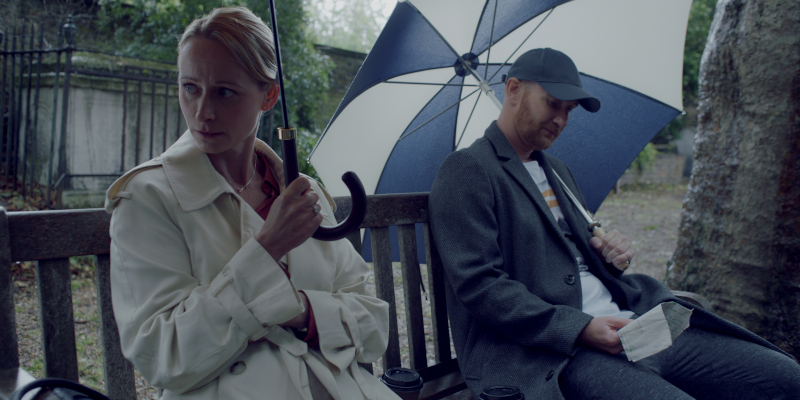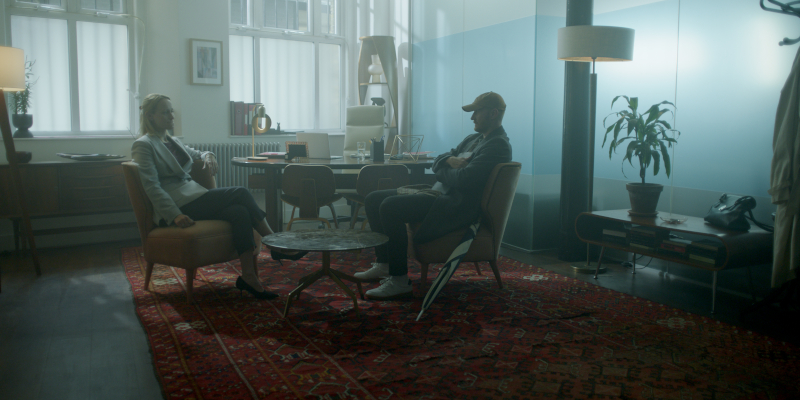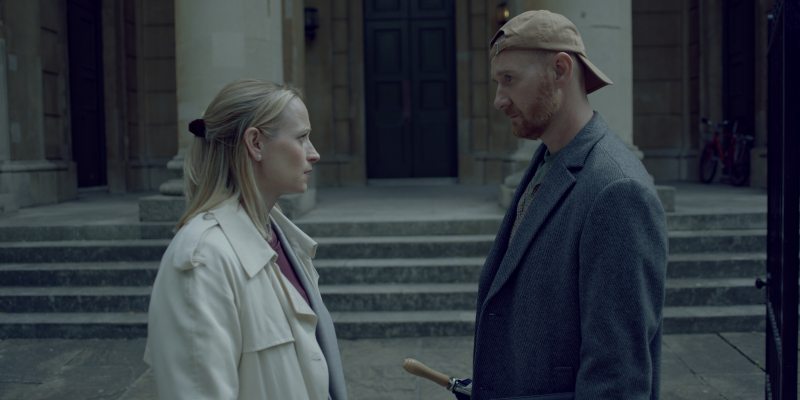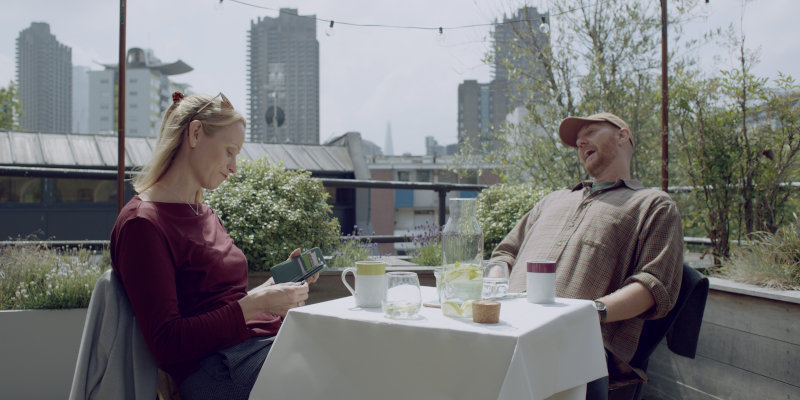Director – Marcus Markou – 2022 – UK – Cert. 15 – 86m
****
A divorcing couple follow instructions in a document they handwrote between them back when it seemed they’d be in love forever – out in selected UK cinemas (admission only one pound) from Friday, March 10th
Cassie (Laura Bayston – smart crimson suit, smart shirt) and Matt (Laurence Spellman from the director’s earlier short Two Strangers Who Meet Five Times – cheap hoodie) are at the end of their relationship. Somewhere along the line, it was good. But then it all went wrong. And now, here they are at their final meeting in her solicitor’s offices (£250 an hour, she’s paying) sorting everything out. She’s given him the house, half her salary.
Back at the beginning of their relationship, between them, they handwrote a document to be read and acted upon should it all come to this. Each of their handwriting gives away which bits they each wrote, which is just as well because their memories aren’t that good and they don’t remember writing parts of it. Or even any of it. But she just wants the chance to say goodbye. Properly. An ending.

First item on the list: to meet up in the park where they first met 20 years ago. So they do that. Have a coffee. They indulge in small talk, past memories. The letter instructs them to recall their first date, which they do. Maybe there’s still something there. Or maybe not, they know each other too well. There’s lots of stuff about the kids, of whom she’s allowed him to have custody, and his attempts to sell / move house. His attempts to start a relationship with Sandra (“it’s Sarah”, he points out) which ran aground and looks like it’s not going to happen. He leaves.
[At a later point, Sarah (Endy McKay) actually turns up. So too, in Cassie’s later scene at an AA meeting, does a greengrocer named Sean (Peter Barrett)… But I digress.]
Cassie and Matt were supposed to bring a feather each, but he failed, only to later find one while skirting the perimeter of the park. He can’t bring himself to go back, so texts her and they have a conversation. And agree to the next task on the list… To meet at her private member’s club where she used to meet her boyfriends, and he is to role-play as if he were another of them… But once there, having started, he finds he doesn’t want to go through with it. Things then take an increasingly perverse turn.

There is much to admire here. The two leads are beautifully cast, expressing in turn when they’re together remorse, control of the other party, regret, hope that they could get back together… And yet, however optimistic the whole feels, you wonder if in fact their relationship, however much one or other of them may wish to rekindle it, is doomed. In those moments where they’ve left each other and are apart, isolated from each other, you really feel the pain… The personal agony… They can’t live with each other, but perhaps they can’t live without each other either… The impossibility of broken relationships… Or perhaps of relationships full stop.
And although it would probably be possible to conceive this as a stage play (although if I’m honest, with the various locations here, I’m not quite sure how) or a radio drama, it works quite brilliantly as a piece of low budget cinema. This is partly because of the freshness of the chosen locations and partly because its half dozen or so scenes aren’t exactly opened out (which is what theatre apologists always say you should do to adapt plays for the screen, which frequently doesn’t work, and I’ve seen far too many of those in my time) so much as conceived as spatial movements through time and place, for instance leaving a scene in one location and running into another character or a different location just round the corner.

It’s peppered with memorable touches – an abandoned attempt at passion in a posh lavatory, a surfacing grief for a lost child, time spent pondering matters spiritual (but not necessarily religious) in a church interior. At one point, it even has the wit to have a male passer-by ignorant of their situation asking if Cassie’s vociferously swearing ex is harassing her. The film doesn’t take on too much, but what it does take on, it tackles most effectively. It’s well worth seeing: a marvel of microbudget filmmaking.
And as if all that wasn’t enough…
(1) also it’s a mere 86 minutes long, which is highly commendable,
(2) it’s showing with director Markou’s (equally good) short, YouTube sensation Two Strangers Who Meet Five Times (12m, 2017, which he’s wisely not attempted to turn into a feature, because it’s great just as it is) and
(3) in a very clever initiative, this double bill is showing only at selected cinemas for the admission price of a mere One Pound. Which makes it even more of a good afternoon or evening out, I’d say. Details below.
The Wife And Her House Husband is out in selected cinemas in the UK (admission only one pound) from Friday, March 10th.
Prince Charles Cinema, London from Friday, March 10th for 3 weeks,
Mockingbird Cinema, Birmingham from Friday, 7th April,
and Orpheus Cinema, Bristol from Friday, 14th April.
Trailer (The Wife And Her House Husband):
Trailer (Cinema For A Pound):
